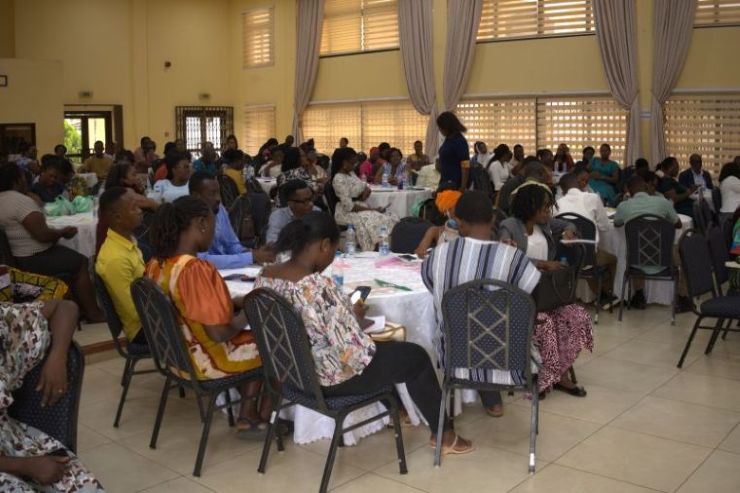The Department of Teacher Education in the School of Education and Leadership recently organised a one-day workshop on Supported Teaching in Schools (STS). This workshop was designed to provide targeted training to mentors and support officers from various partner districts and schools, equipping them with essential skills and knowledge for guiding student teachers through the STS process.

A cross-section of participants
The workshop brought together faculty from the University of Ghana and representatives from Partner Districts and Schools to exchange ideas on enhancing support for student teachers. With a focus on clarifying the specific roles and responsibilities of mentors, the training highlighted practical approaches to help student teachers succeed in real classroom environments.
Dr. Kwaku Darko Amponsah, the Head of the Department of Teacher Education
Dr. Kwaku Darko Amponsah, the Head of the Department of Teacher Education, officially welcomed participants to the workshop. He then proceeded to introduce the speakers, setting the stage for an engaging and informative workshop.
In his opening remarks, Mr. Joseph Oduro Nkansah, College Registrar, praised the Department of Teacher Education for its commitment to bridging theoretical knowledge with practical experience. He highlighted the increasing importance of practical training within real school environments, describing mentors and support officers as crucial to creating impactful learning opportunities for student teachers.
Prof. Gordon S.K. Adika, Dean, School of Education and Leadership
Prof. Gordon S.K. Adika, Dean of the School of Education and Leadership, welcomed participants and reiterated the University of Ghana’s commitment to advancing teacher education in Ghana. He noted that the primary mission of teacher education is to produce skilled, inspiring teachers capable of elevating student outcomes nationwide. Through the STS initiative, student teachers gain opportunities to observe and collaborate with seasoned educators, acquiring knowledge in areas such as the National Teaching Standards, school curriculum, ethics, professionalism, effective teaching practices, assessment techniques, professional learning communities and school-community relations.
A cross-section of participants
Prof. Adika further explained that recent reforms in Ghana’s teacher education, particularly the new four-year Bachelor of Education (B.Ed.) programme, place a strong emphasis on practical school-based training. This includes establishing partnerships with districts and high-performing schools, as well as training mentors to support student teachers' hands-on learning. He stressed the importance of these partnerships in ensuring that mentors are well-prepared to guide student teachers effectively.
Dr. Emmanuel Adjei-Boateng, Coordinator of the B.Ed. programme
Dr. Emmanuel Adjei-Boateng, Coordinator of the B.Ed. programme in the University of Ghana, discussed Ghana’s traditional reliance on demonstration schools for teacher training. He noted that, although these schools provide high-quality teaching and resources, they often present an idealised version of teaching that does not t always align with conditions in many communities. This disconnect between training environments and real classrooms, he explained, has led some students to reconsider teaching as a career.
A cross-section of participants
Dr. Adjei-Boateng explained that, to address this gap, educational authorities have mandated that teacher education institutions collaborate with "schools of excellence" staffed by dedicated and skilled teachers who can mentor students in applying classroom knowledge to real-world scenarios. He stressed the importance of this hands-on approach, saying, “When we expose students to real classrooms, they understand discipline issues, the new curriculum and the importance of community relations.” Such experience, he added, is key in helping students bridge the gap between theoretical concepts and practical applications.
A cross-section of participants
District Directors, School Improvement Support Officers (SISO) and Head Teachers participated in the workshop and are expected to play essential roles in mentoring student teachers. Head Teachers, designated as lead mentors, will oversee selected teachers who will work closely with student teachers throughout their training. This collaboration aims to provide support in various teaching aspects, including classroom management and curriculum implementation, helping student teachers integrate their theoretical training with real-world practice.
A cross-section of participants
The Supported Teaching in Schools (STS) model is anticipated to improve teacher preparedness and enhance student learning across the nation. By promoting strong mentorship and support systems in schools, this approach acknowledges that becoming a teacher starts not only in lecture halls but also within the vibrant and sometimes challenging, realities of classrooms.
Also in attendance were: Dr. Kwaku Darko Amponsah, Head, Department of Teacher Education; Dr. Joyce Senya Anku, STS Coordinator; Eld. Nana Dr. Abraham Kwadwo Okrah and Dr. Sedofia both from the Department of Teacher Education.